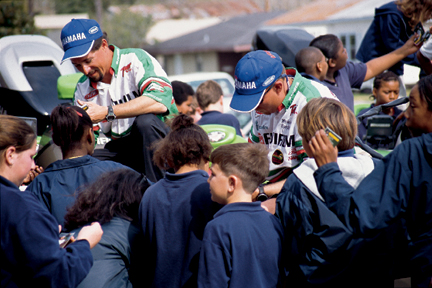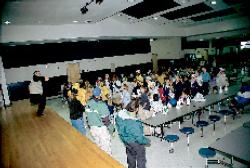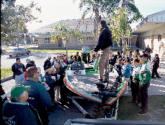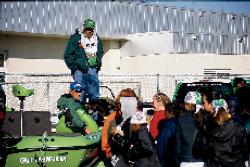Playing hooky

Fujifilm anglers team up for education
My first memory of the term “playing hooky” came from “The Adventures of Huckleberry Finn” by Mark Twain. In that classic tale, Huck Finn would occasionally “lay out of school” to do something more worthwhile – like go fishing.
Throughout my high school and college years, I perfected the art of playing hooky. To this day, I am still pretty proficient at “laying out of work” to do something more worthwhile – like go fishing.
But what about those who fish for a living? How does a professional bass angler play hooky? They are already fishing, so if they play hooky, what do they do?
Ironically, some pros “lay out of fishing” to go to school. That’s what members of the Fujifilm fishing team do when they have a day off during a Wal-Mart FLW Tour event.
At nearly every stop on the FLW Tour, the team visits a local elementary or middle school to educate children on the importance of going fishing.
So what is so important about going fishing?
 Actually, Fuji’s team of professional anglers, along with J.J. the Dancing Machine, has quite a bit to say about how fishing relates to education, self-esteem and conservation.
Actually, Fuji’s team of professional anglers, along with J.J. the Dancing Machine, has quite a bit to say about how fishing relates to education, self-esteem and conservation.
“As a youngster, I had a lot of opportunities to get into trouble,” says Fuji pro Sam Swett to a group of fifth-graders at Julia B. Maitland Elementary School in Morgan City, La. “But because I loved to fish, fishing kept me out of trouble. Fishing also gave me direction and structure. I had to do my schoolwork and chores before I could go fishing, so I made sure I got those done as soon as possible so I could fish.”
During the same visit, team member Sean Stickler urges the students to stay in school.
“You may not realize it now, but your teachers and principals are pretty smart folks,” he says. “Listen to them, and someday you will be glad you did. I obeyed my teachers in school, and now I am able to do what I want for a living.”
Joel Richardson gives the kids even more of a reason to learn by explaining how reading and math skills are critical in his profession.
“I did not have anybody take me out and show me how to fish tournaments,” he says. “I had to learn on my own, and that required reading a lot of books and magazines about fishing. Out on the water, I have to read maps and do math calculations to figure out how far I am going, how long it will take to get there, and how much gas I will need. If I can’t do math, I might get lost out there in the middle of the lake.”
At Clewiston Middle School in Florida, Fuji team member Randy Blaukat makes kids aware of how important their natural resources are and explains the crucial role of conservation.
 “Lake Okeechobee, right here where you live, is world-famous,” Blaukat explains to a group of sixth-graders. “People from all over the world come here to fish and to see the big alligators. That’s why it’s important that you treat nature kindly and don’t litter.”
“Lake Okeechobee, right here where you live, is world-famous,” Blaukat explains to a group of sixth-graders. “People from all over the world come here to fish and to see the big alligators. That’s why it’s important that you treat nature kindly and don’t litter.”
Wesley Strader encourages the children to follow their dreams. He relates a few of the hurdles he had to overcome to be a professional touring angler.
“No matter what you want to do or accomplish, there are going to be people who will doubt you, and there will be things that will get in your way – that’s why you must believe in yourself,” he says.
Another inspirational lesson for the students comes from J.J. the Dancing Machine. J.J. is a centerpiece at the FLW Tour Family Fun Zones. He entertains kids by teaching them how to dance and have a good time.
At the school visits, J.J. gets the kids’ attention by dancing around and acting crazy. When he asks for volunteers to dance like him, the students sit stolid as if they would never get up and act so goofy in front of their peers.
Then J.J. turns off the music and tells them how he used to be terrified of being in front of people for fear of making a mistake and having people laugh at him. He interacts with several students by asking them if they have ever been laughed at or picked on. He gives them suggestions on how to handle bullies and what to do if someone laughs at them.
“If someone picks on you, just put out your hand and say, `Stop! I can’t hear you. Laugh at me all you want because I really don’t care what you think.'”
The kids listen to his message about not doing what everyone else is doing just because it’s “cool.”
“Don’t be afraid to do your own thing, and don’t be afraid to be laughed at,” he announces enthusiastically. “Now let’s get up and dance!”
The second time J.J. turns up the music, a room full of kids start dancing, imitating J.J.’s crazy moves and laughing with each other. Even the Fuji pros get in on the groove.
After J.J. warms up the kids and the anglers have spoken to them about the importance of education and conservation, the students are brought outside to look at the anglers’ boats. They look on with interest as the pros tell them about different functions of the boat. Boating safety is one of the first topics addressed.
“Just like NASCAR drivers must wear helmets, we must wear life vests,” Strader says. “As part of our rules, we must wear a life vest hooked up to this kill switch any time the big engine is running. If we are thrown out of the boat, the kill switch stops the engine, and the life vest keeps us afloat.”
A boy asks, “What if your boat fills up with water? Will it sink?”
 Then Strader flicks the bilge pump switch, and water comes squirting out of the rear of the boat. A few children squeal with surprise.
Then Strader flicks the bilge pump switch, and water comes squirting out of the rear of the boat. A few children squeal with surprise.
“Don’t worry, it’s just the bilge pump,” Strader says. “That’s how we get the water out of our boat so it doesn’t fill up.”
Blaukat shows off the livewells and allows kids to peek inside. “This is how we keep our fish alive so we can release them back into the lake,” he says.
In the front of the boat, he demonstrates how the trolling motor works and explains the role it plays in fishing. He also turns on the depth finders so the children can see how the anglers find fish.
The school visit ends with the anglers passing out free Fujifilm megaphones, bandanas and baseball-style fishing cards. The pros sign autographs and answer any questions the children may have.
I bet even Huck Finn would come to school for a couple of hours to hear about fishing.